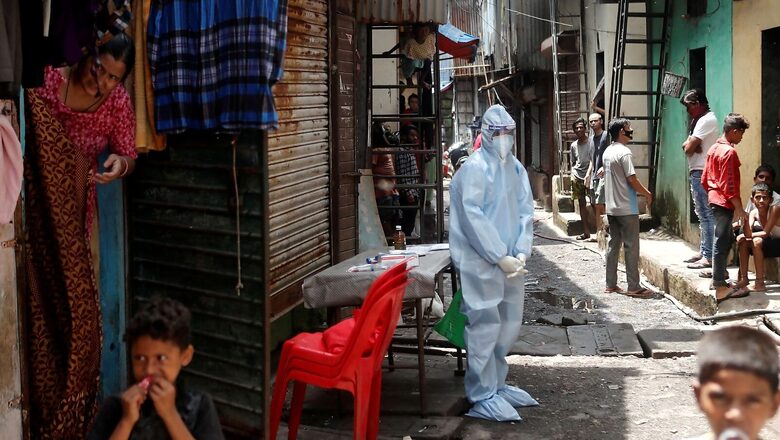
views
In view of a surge in Covid-19 cases over the past week and in the weekly positivity rate, the Centre on Friday advised five states to maintain a strict watch and take pre-emptive action, if needed, to control any emerging spread of the infection.
This advisory is not all in terms of what the country is seeing on the Covid-front. New coronavirus infections in India in a single day were recorded above 4,000 after 84 days on Friday. Mumbai has seen its biggest spike since February 4, amid the Omicron variant-driven wave and authorities in Delhi are attempting to enforce stricter compliance to Covid-19 norms in the city and the airport.
Are we heading towards a fourth wave of Covid-19? News18 explains:
Centre Flags ‘Localised’ Spread
In a letter to Tamil Nadu, Kerala, Telangana, Karnataka and Maharashtra, Union Health Secretary Rajesh Bhushan highlighted that a few states were reporting a higher contribution to India’s caseload, indicating the possibility of a localised spread of the infection. “There is, therefore, a need to follow a risk assessment-based approach on the public health responses without losing the gains made so far in the fight against the pandemic,” Bhushan said.
In the letter, he mentioned a sustained and significant decline in the number of COVID-19 cases has been observed in India over the past three months. However, a slight upsurge in cases is being noticed, with 15,708 new infections being reported in a week ending on May 27, which rose to 21,055 cases in a week ending on June 3.
Also, there is a rise in the weekly positivity from 0.52 per cent in a week ending May 27, 2022 to 0.73 per cent in a week ending June 3. Let us take a look at the pattern rise in cases in these states:
How Bad is the Covid Situation In These States?
Tamil Nadu
According to the Centre’s letter, Tamil Nadu has reported an increase in weekly new cases from 335 in the week ending on May 27 to 659 in the week ending on June 3. The state has also seen an increase in positivity in the last week from 0.4 per cent to 0.8 per cent. While analyzing district-wide COVID-19 situations, it has been observed that two districts, Chennai and Chengalpattu, have recorded an increase in weekly cases and positivity.
Kerala
Kerala has reported an increase in weekly new cases from 4,139 new infections in the week ending on May 27 to 6,556 in the week ending on June 3, accounting for 31.14 per cent of India’s new cases in the week ending on June 3. The state saw an increase in positivity in the last week from 5.2 per cent to 7.8 per cent, Bhushan mentioned in the letter. While analyzing district-wide COVID-19 situation, it was observed that 11 districts Ernakulam, Thiruvananthapuram, Kottayam, Kozhikode, Pathanamthitta, Idukki, Alappuzha, Kollam, Kannur, Malappuram and Wayanad have recorded an increase in weekly cases and positivity, he said.
Telangana
Telangana, the letter highlighted, has reported an increase in weekly new cases from 287 new infections in the week ending on May 27 to 375 new infections in the week ending on June 3, accounting for 1.78 per cent of India’s new cases in week ending on June 3. It has also seen an increase in the positivity in the last week from 0.4 per cent to 0.5 per cent.
Maharashtra
Maharashtra has reported an increase in weekly new cases from 2,471 new infections in the week ending on May 27 to 4,883 in the week ending June 3, accounting for 23.19 per cent of India’s new cases in week ending on June 3. The state has also seen an increase in positivity in the last week from 1.5 per cent to 3.1 per cent, the letter stated. It has been observed that six districts Mumbai Suburban, Mumbai, Thane, Pune, Raigad and Palghar have recorded an increase in weekly cases and positivity.
Karnataka
Karnataka has reported an increase in weekly new cases from 1,003 new infections in the week ending on May 27 to 1,446 in the week ending on June 3, accounting for 6.87 per cent of India’s new cases in week ending on June 3. It has also seen an increase in positivity in the last week from 0.8 per cent to 1.1 per cent, the letter said. Bengaluru Urban has recorded an increase in weekly cases and positivity.
BMC Rushes to Up Testing Amid ‘Possible’ Fourth Wave in July
Meanwhile, the Brihanmumbai Municipal Corporation (BMC) on Friday directed the city health departments to ramp up Covid-19 testing amid a possible fourth wave of Covid-19.
“The number of Covid-19 cases are increasing rapidly in the last few days in Mumbai. In view of the possible fourth wave warning given by medical experts and the possibility of water-borne diseases during Monsoon, Municipal Commissioner Dr Iqbal Singh Chahal has instructed that all the concerned departments should be equipped,” the civic body said in an official statement.
Anticipating a new wave, BMC officials met with all officials on Friday, urging them to increase testing, hold testing camps in housing societies where many positive cases have been reported, and re-equip jumbo centres and ward war rooms, a report by the Times of India said.
The BMC chief stated at the meeting that with experts from IIT Kanpur predicting that the fourth wave will hit in July, the city must be extremely cautious. It has been decided to increase testing from 8,000 tests per day to 30,000-40,000 tests in the coming days.
The Maharashtra health department on Friday also asked district and civic authorities to ramp up Covid-19 testing.
In a letter to collectors, municipal corporations and chief executive officers, Additional Chief Secretary (Health) Pradeep Vyas said all districts should ensure the proportion of RT-PCR tests was at least 60 per cent.
Are the New Variants BA.4 and BA.5 a Cause of Concern?
After the country began reporting Omicron sub-variants BA.4 and BA.5, there were bells of alarm as Covid-19 spikes around the world have been attributed to these sub-variants. But virologists and experts warned against being overly concerned about infections. It is critical to remain vigilant, but there is no need to panic because the majority of the population has been vaccinated or has been infected.
Noted virologist, Dr Shahid Jameel, told The Indian Express , “We have to be vigilant of course. If one is exposed to the virus, he/she may get infected but will not progress to mild disease. This is mainly because most people in the country have either been exposed to the virus or have been vaccinated. This will continue as several endemic infections behave in this manner. What we need to be vigilant about is how many are hospitalised.”
Dr. Sanjay Pujari, an expert member of the Indian Council of Medical Research (ICMR), also told the Indian Express that even if antibody levels decline over time, the T cells memory cells, which are primed for immune response to the virus, are responsible for preventing severe illness. “The evolution of SARS-CoV2 virus, in terms of lineages and because of its ability to escape immunity, has been challenging. The new sub-variants have had the highest escape potential to vaccination and hybrid immunity. Prevention of infection is the function of neutralising antibodies and while these wane, new sub-variants add to the ability to develop reinfections. The reason, however, for mild disease, is due to T Cell immunity,” he said.
What Is the Path Ahead?
States have been asked to refer to the directions issued in a letter by the ministry dated April 8, 2022 for strategic areas of intervention like relaxation in various activities, testing and surveillance, clinical management, vaccination, and community engagement with an increased focus on evidence-based decision making.
They have been advised to continue implementation and monitoring of necessary measures for prompt and effective management of COVID-19 and to ensure compliance with various advisories issued by the ministry.
The five-fold strategy of test-track-treat-vaccination and adherence to Covid-appropriate behaviour should be followed, along with monitoring of clusters of new COVID-19 cases and adequate testing as per guidelines, Bhushan said in the letter.
Focus should also be on monitoring of Influenza-like illnesses (ILI) and SARI cases in all health facilities on a regular basis for detecting early warning signals of the spread of infection and genomic sequencing for prescribed samples of international passengers, collection of samples from sentinel sites (identified health facilities), and local clusters of cases.
The Delhi High Court, meanwhile, on Friday called for strict action against those found violating masking and hand hygiene norms at airports and in aircraft, observing that the COVID-19 pandemic has not abated and keeps springing up its ugly head.
The high court said all such persons, who are found to be violating these norms, should be booked and fined and they should be placed on the no-fly list and added that it is essential to introduce sufficient deterrence to enforce compliance of norms. It said it is noticed that very often the norms are not implemented on the ground with the seriousness with which they are framed and therefore, it is essential for the authorities, including Directorate General of Civil Aviation (DGCA) to ensure that the implementation on the ground is effected properly.
With inputs from agencies
Read all the Latest India News here




















Comments
0 comment